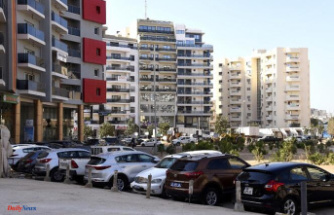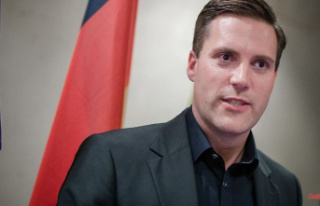The job market in Mecklenburg-Western Pomerania continues to be robust. Despite the uncertainties and gloomy economic prospects, unemployment fell. However, the autumn revival is more subdued than usual.
Schwerin/Kiel (dpa/mv) - The number of unemployed in Mecklenburg-Western Pomerania has fallen slightly, but remains above the previous year's level. As the Regional Directorate North of the Federal Employment Agency in Kiel announced on Wednesday, 58,300 people in the north-east were unemployed in October. That was 700 fewer than in September, but 3,700 more than in October 2021.
As reasons for the development, the head of the Kiel agency, Markus Biercher, cited an autumn revival weakened by the energy crisis and the transition of Ukrainian refugees to basic security. "For example, 4,900 Ukrainian women and men are currently registered as unemployed in Mecklenburg-Western Pomerania; in October 2021 there were a total of 220," explained Biercher.
The unemployment rate in Mecklenburg-Western Pomerania is currently 7.2 percent, which was the third highest nationwide after Bremen and Berlin. In September it was 7.3 percent. With 2.44 million unemployed across Germany, the Federal Employment Agency put the unemployment rate at 5.3 percent. The district of Rostock is again very close to the national average, with the lowest rate in the north-east at 5.4 percent. The highest was calculated for Schwerin with 8.7 percent.
According to Biercher, the demand for personnel in Mecklenburg-Western Pomerania was above the previous year's level. In October, the agency had 18,900 jobs subject to social security contributions, 800 more than a year ago. Skilled workers are primarily sought in the health and social services as well as in trade and hospitality. There has also been an increase in employment in these sectors. Young people in particular, whose transitional unemployment after completing their training is becoming shorter and shorter, and the long-term unemployed have benefited from the increased demand. There was a decline in employment subject to social security contributions in the manufacturing sector with a minus of 2100 jobs.
According to Economics Minister Reinhard Meyer (SPD), securing skilled workers remains one of the most pressing issues in companies. "Companies are actively looking for trained specialists. This is particularly gratifying after months of the crisis," explained Meyer. Many companies would have recognized the signs of the times and tried to secure skilled workers and attract new ones with incentives. The state supports the efforts and also appreciates the willingness to pay decent wages. For companies that are bound by a collective agreement, the subsidy rates are five percentage points higher. In addition, qualitative criteria came to the fore even more when it came to investment promotion.
Henning Foerster from the left-wing faction in the state parliament called for increased efforts to combat long-term unemployment. "37.5 percent of the more than 58,000 people affected by unemployment have been without a job for a year or longer. And this at a time when not only a shortage of skilled workers, but increasingly also a lack of workers is being complained about in a wide variety of sectors," he said. The key to successful labor market integration lies primarily with the federal government. If, as planned, this shortens the so-called integration title by 609 million euros for 2023, this will primarily be at the expense of the long-term unemployed. "The Bundestag is required to prevent the planned deletions," emphasized Foerster.












